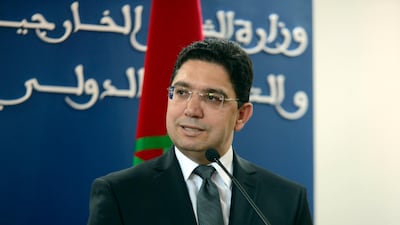Morocco has cut its diplomatic ties with Iran, the kingdom's foreign minister said on Tuesday, citing Tehran's support for the separatist Polisario Front as the cause for the split.
The diplomatic rift will result in the closure of the Moroccan embassy in Tehran and the expulsion of the Iranian ambassador from the capital Rabat, Foreign Minister Nasser Bourita told reporters.
The minister accused Iran and its ally Hezbollah of supporting the Polisario Front, a decades-old movement intent on ending Moroccan presence in Western Sahara.
"Hezbollah sent military officials to Polisario and provided the front with...weapons and trained them on urban warfare", Mr Bourita said.
He told reporters that "a first shipment of weapons was recently" sent to the Algerian-backed Polisario Front via an "element" at the Iranian embassy in Algiers.
The Western Sahara region has effectively been split by an earthen wall separating an area controlled by Morocco that it claims as its southern provinces and territory controlled by the Polisario. There is a UN-mandated buffer zone between them.
Magnus Norell, an adjunct scholar of The Washington Institute for Near East policy who has written extensively about Morocco, said the decision was “not surprising.”
“It’s been an ongoing story for some time now”, Mr Norell said of Iran’s alleged support for the Polisario. He noted that several reports over the last few years have mentioned Tehran's support for the Front through the Lebanese militant juggernaut Hezbollah.
"In that sense, it's not new. We know Hezbollah has been active in West Africa, through drug networks and other illicit activities for at least ten years" Mr Norell told The National.
The support, he argued, remains “fairly vague but persistent” and suggested that the Moroccan authorities would have substantive intelligence about it before taking these harsh diplomatic decisions on Tuesday.
The Polisario issue is a red line for the Moroccan government, explained Mr Norell. Adding that the combination of support for the rebel group, a history of tense Moroccan relations with Iran, and current negotiations about the nuclear deal involving Tehran’s regional role, explain the timing behind the decision.
The fracture comes just one day after the announcement of an Israeli intelligence operation claiming to have revealed Tehran's "secret" nuclear programme.
Prime Minister Benjamin Netanyahu said on Monday that Israel had covertly obtained 55,000 records and 55,000 files stored on 183 CDs relating to an Iranian bid to secretly pursue nuclear weapons activity.
In 2009, Morocco cut diplomatic links with Iran, accusing it of questioning Bahrain's ruling party. Ties were gradually restored around 2014, but they were never fully strengthened.
"We stand with Morocco in every positive as it always stands with us", tweeted Bahrain's foreign minister Khalid Al Khalifa on Tuesday evening. "And we pay the strength of his right decision to sever relations with Iran as a result of its support for enemies in cooperation with the terrorist Hezbollah God Save the King Mohammed VI and the brotherly Moroccan people".
The UAE also showcased its support with a statement from the Ministry of Foreign Affairs and International Co-operation condemning Iran's interference in the country's internal affairs. The statement said the UAE stands with Morocco "in all that guarantees its security and stability".
Minister of State for Foreign Affairs, Dr Anwar Gargash, also tweeted: "We stand with Morocco in its concern for its national issues and against Iranian interference in its internal affairs, our policy and our support for Morocco has a well-established historical legacy of Sheikh Zayed and the King Hassan, who have mercy on them, and our position is constant in good times and adversity".
Algeria, Morocco's neighbour, hosts camps of displaced from the conflict region and Polisario members.
On Friday, the UN Security Council backed a US-drafted resolution that urges Morocco and the Polisario Front to prepare for talks on settling the decades-old conflict.
It also renewed for six months the mandate of a UN mission that has been monitoring the ceasefire in Western Sahara since 1991.
Diplomatic efforts to end the conflict have been deadlocked since the last round of UN-sponsored talks in 2008.
Morocco maintains that negotiations on a settlement should focus on its proposal for autonomy for Western Sahara and rejects the Polisario's insistence on an independence referendum.
With additional reporting by Joyce Karam

